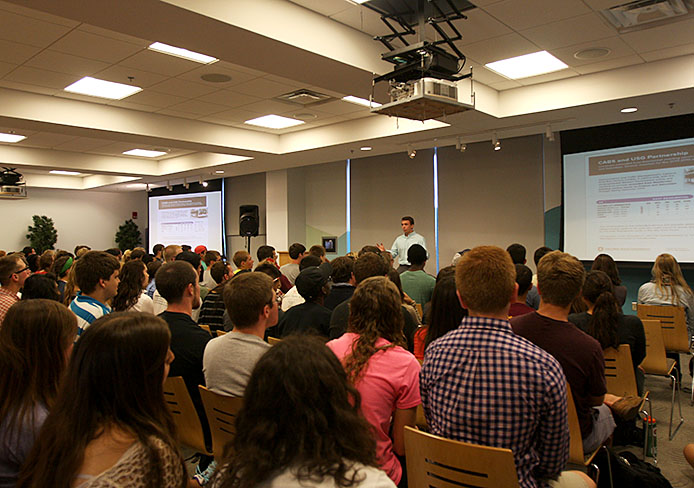
USG President Taylor Stepp addresses students at a USG meeting Sept. 5 at the Ohio Union. Credit: Shelby Lum / Photo editor
Some Ohio State Undergraduate Student Government members recently faced a brief claiming they had been appointed unconstitutionally. Though the case was dropped and the matter was settled, there is a chance it could reappear.
The brief, which was filed with the judicial panel of USG, alleged USG senior staff and executive directors had not been appointed by constitutional means because they were not approved by the Oversight Committee, said USG Chief Justice Tyler Byrum, a fourth-year in engineering physics.
“A brief was filed last week saying there was an alleged constitutional violation with the processing of appointees in the General Assembly,” Byrum said. “It alleged that they weren’t sent through the Oversight Committee, which … was an addition that just got put in.”
One of the Oversight Committee’s basic purposes is to make sure the candidates are “good, active candidates,” Byrum said. The Oversight Committee was created in the USG Constitution amended in March.
The matter was settled outside of an official court decision over the weekend and the appointees will be sent back through the Oversight Committee, Byrum said, but if the terms of the settlement aren’t met, the brief may reappear. However, he said he doesn’t see that happening.
“I don’t expect it to be refiled, I’d be surprised,” Byrum said. “It’s not an egregious error … It was just something that happened by mistake and it’s getting fixed.”
There are eight people on the senior staff and 11 executive directors, all of whom were allegedly not approved in the constitutional manner required. USG President Taylor Stepp, a fourth-year in public affairs, emphasized the issue was “not directed at those individuals” but at the matter in which they were appointed.
Senior staff and executive director appointments are submitted by the USG president, Stepp, to the General Assembly for approval. The Oversight Committee is supposed to approve the appointments before the General Assembly officially does.
The chair of the Oversight Committee and USG parliamentarian, third-year in political science Erik Leiden, said Friday the committee has three responsibilities — approving the executive board appointments and the director appointments, as well as a third role related to approving new constitutional amendments and bylaws.
The senior staff, Leiden said, was appointed in the spring and the directors were appointed in the fall.
He said there was “a lot of discussion” but it was mostly generally accepted in the spring that the process USG had followed was acceptable, so the second time the directors’ appointments went through in the same manner.
Josh Ahart, USG vice president and a fourth-year in public affairs, is the speaker of the USG General Assembly. He said although he did not have an “active or large role” in the case, he believes it was just an issue with adjusting to the new constitution.
“This (case) ended up being one of those small hiccups in the road,” Ahart said. “Everyone is happy now with the outcome … It was honestly just a procedural issue and it was one of those things where it just, it happened but it’s been taken care of.”
He compared USG adapting to its new constitution to OSU getting accustomed to its new academic schedule.
“It’s a lot like semesters. It’s taken us a while to get used to semesters and it’s going to take us a while to get used to the new constitution,” Ahart said. “We’re working hard to correct these issues and to make sure they don’t happen again.”
Stepp said he wasn’t involved in the case’s handling because it was a General Assembly issue, but like Ahart said, the problem had to do with getting used to the new constitution, and he wasn’t concerned when he heard about the case.
“I was immediately just like, ‘OK, this is just another instance where we’ve got some procedural issues we’ve got to get resolved,’” Stepp said. “I wasn’t alarmed.”


